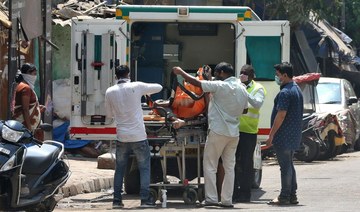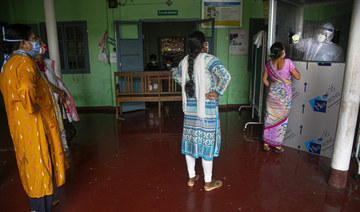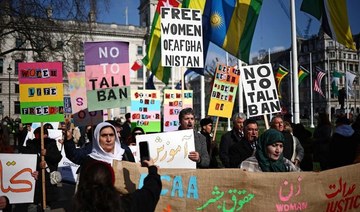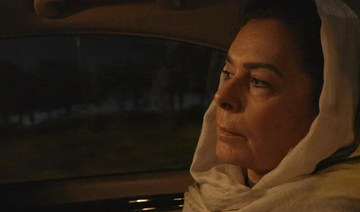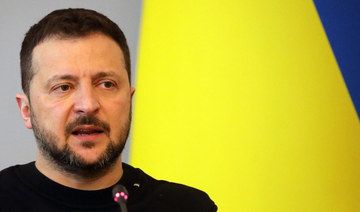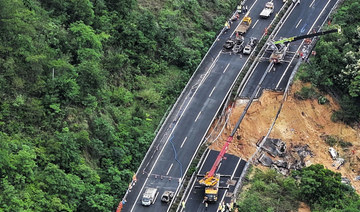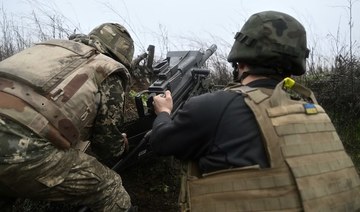NEW DELHI: India’s financial capital Mumbai imposed fresh coronavirus restrictions on Monday as a rise in cases in the worst-affected region sparked fears of a new wave, while the country’s vast inoculation drive fell behind schedule.
All religious, social and political gatherings are banned in the city and the surrounding western state of Maharashtra, home to 110 million people, after infections spiked to levels last seen in October.
Maharashtra chief minister Uddhav Thackeray said he was “worried about the severity of a second wave if it hits the state,” which has recorded nearly 52,000 deaths since the pandemic began.
“The simple mantra is wear a mask, follow discipline and avoid lockdown. We will review the situation again in the next eight days and decide on a lockdown,” Thackeray said in a live television address on Sunday.
Elsewhere in the state there were tighter restrictions.
India’s tough nationwide lockdown imposed in March has largely been relaxed, with even its famously lavish weddings and cricket crowds returning, albeit with numbers capped.
Daily new cases peaked at more than 97,000 in September but have been falling sharply, coming in at under 9,000 a day earlier this month.
But the past two weeks have seen an uptick, with around 14,000 new infections on Monday, the biggest rise coming in Maharashtra, taking India’s total past 11 million since the pandemic began with 156,000 deaths.
In the capital New Delhi, which on Monday recorded just 46 new infections and two deaths in the crowded megacity of 20 million, locals said they were still concerned.
“If we look worldwide, in places where they let the guard down cases have increased again,” said 44-year-old sales and marketing professional Gaurav Kumar.
“We cannot afford to take things lightly, given our population size and recent history of cases.”
Anand Krishnan, a professor at the AIIMS hospital in Delhi, said it was too soon to say whether there would be a new wave, but he said the “primary focus” should be on sticking to precautions like masks, and vaccines.
India’s huge inoculation drive is lagging behind schedule as the world’s biggest vaccine maker said it had been told to prioritize domestic supplies ahead of exports to other poor countries.
India began vaccinating health care and other frontline workers from mid-January, aiming to inoculate 300 million people — or 600 million shots in a two-dose regime — by July.
But at the current pace, with 11.1 million shots given as of Monday, that will take several years.
The head of India’s Serum Institute, which other poor countries are relying on for supplies of the AstraZeneca vaccine, said on Sunday it had been “directed to prioritize the huge needs of India.”
Adar Poonawalla did not clarify whether these were new instructions or if they were related to the slow pace of India’s vaccine rollout. A spokesperson declined to comment further.
Mumbai imposes fresh coronavirus restrictions after spike in cases
https://arab.news/8xc9u
Mumbai imposes fresh coronavirus restrictions after spike in cases
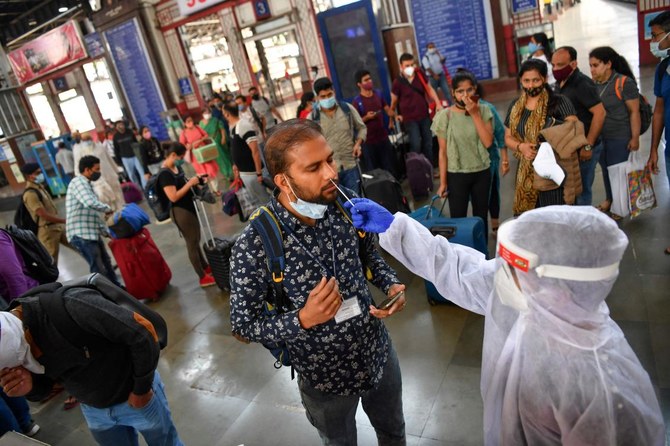
- All religious, social and political gatherings are banned in the city
- India’s tough nationwide lockdown imposed in March has largely been relaxed
A British-Palestinian doctor was denied entry to France for a Senate meeting about the war in Gaza
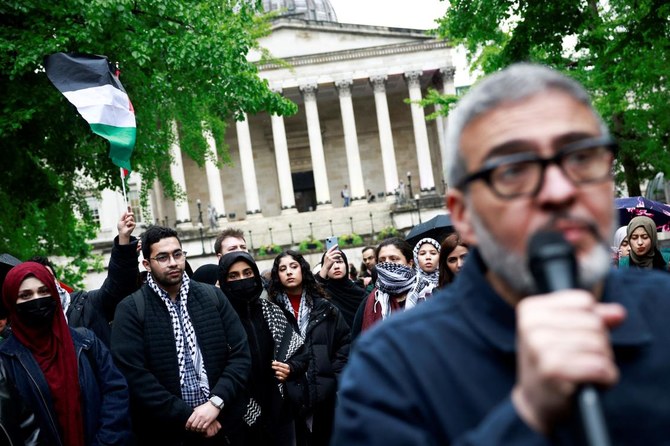
Abu Sitta posted on social networks that he was denied entry in France because of a one-year ban by Germany on his entry to Europe
PARIS: A well-known British-Palestinian surgeon who volunteered in Gaza hospitals said he was denied entry to France on Saturday to speak at a French Senate meeting about the Israel-Hamas war. Authorities wouldn’t give a reason for the decision.
Dr. Ghassan Abu Sitta was placed in a holding zone in the Charles de Gaulle airport and will be expelled, according to French Sen. Raymonde Poncet Monge, who had invited him to speak at the Senate.
‘’It’s a disgrace,’’ she posted on X.
Abu Sitta posted on social networks that he was denied entry in France because of a one-year ban by Germany on his entry to Europe. Germany denied him entry last month, and France and Germany are part of Europe’s border-free Schengen zone. He posted Saturday that he was being sent back to London.
The French Foreign Ministry, Interior Ministry, local police and the Paris airport authority would not comment on what happened or give an explanation.
Abu Sitta had been invited by France’s left-wing Ecologists group in the Senate to speak at a colloquium Saturday about the situation in Gaza, according to the Senate press service. The gathering included testimony from medics, journalists and international legal experts with Gaza-related experience.
Last month Abu Sitta was denied entry to Germany to take part in a pro-Palestinian conference. He said he was stopped at passport control, held for several hours and then told he had to return to the UK He said airport police told him he was refused entry due to “the safety of the people at the conference and public order.”
Abu Sitta, who recently volunteered with Doctors Without Borders in Gaza, has worked during multiple conflicts in the Palestinian territories, beginning in the late 1980s during the first Palestinian uprising. He has also worked in other conflict zones, including in Iraq, Syria and Yemen.
France has seen tensions related to the Mideast conflict almost daily since the deadly Oct. 7 Hamas incursion into Israel. In recent days and weeks police have cleared out students at French campuses holding demonstrations and sit-ins similar to those in the United States.
Afghanistan’s only female diplomat resigns in India after gold smuggling allegations
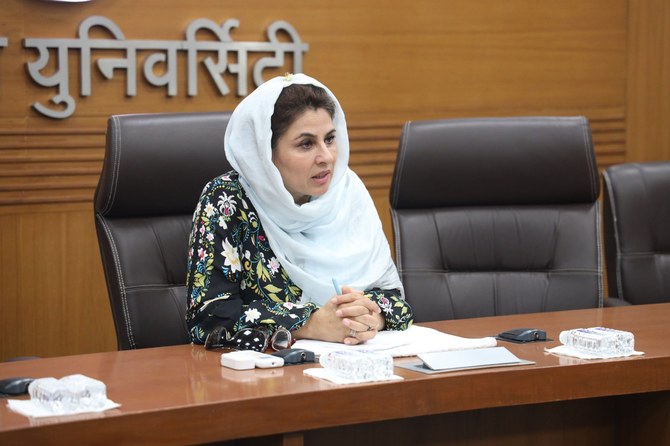
- Zakia Wardak, the Afghan consul-general for Mumbai, announced her resignation on her official account on the social media platform X
- According to Indian media reports, she has not been arrested because of her diplomatic immunity
ISLAMABAD: Afghanistan’s diplomat in India, who was appointed before the Taliban seized power in 2021 and said she was the only woman in the country’s diplomatic service, has resigned after reports emerged of her being detained for allegedly smuggling gold.
Zakia Wardak, the Afghan consul-general for Mumbai, announced her resignation on her official account on the social media platform X on Saturday after Indian media reported last week that she was briefly detained at the city’s airport on allegations of smuggling 25 bricks of gold, each weighing 1 kilogram (2.2 pounds), from Dubai.
According to Indian media reports, she has not been arrested because of her diplomatic immunity.
In a statement, Wardak made no mention of her reported detention or gold smuggling allegations but said, “I am deeply sorry that as the only woman present in Afghanistan’s diplomatic apparatus, instead of receiving constructive support to maintain this position, I faced waves of organized attacks aimed at destroying me.”
“Over the past year, I have encountered numerous personal attacks and defamation not only directed toward myself but also toward her close family and extended relatives,” she added.
Wardak said the attacks have “severely impacted my ability to effectively operate in my role and have demonstrated the challenges faced by women in Afghan society.”
The Taliban Foreign Ministry did not immediately return calls for comment on Wardak’s resignation. It wasn’t immediately possible to confirm whether she was the country’s only female diplomat.
She was appointed consul-general of Afghanistan in Mumbai during the former government and was the first Afghan female diplomat to collaborate with the Taliban.
The Taliban — who took over Afghanistan in 2021 during the final weeks of US and NATO withdrawal from the country — have barred women from most areas of public life and stopped girls from going to school beyond the sixth grade as part of harsh measures they imposed despite initial promises of a more moderate rule.
They are also restricting women’s access to work, travel and health care if they are unmarried or don’t have a male guardian, and arresting those who don’t comply with the Taliban’s interpretation of hijab, or Islamic headscarf.
Russia puts Ukraine's Zelensky on wanted list, TASS reports
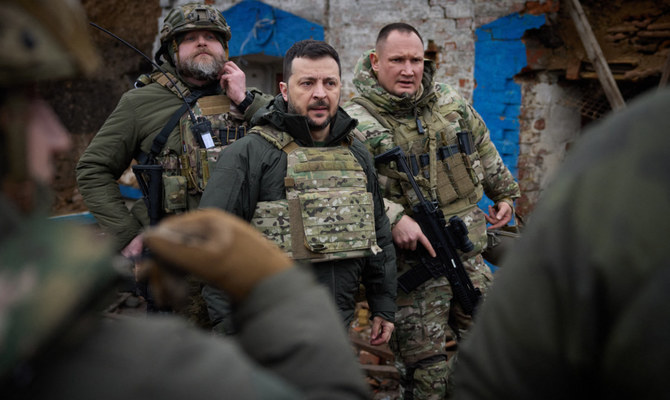
- Russia has issued arrest warrants for a number of Ukrainian and other European politicians
MOSCOW: Russia has opened a criminal case against Ukrainian President Volodymyr Zelensky and put him on a wanted list, the state news agency TASS reported on Saturday, citing the Interior Ministry's database.
The entry it cited gave no further details.
Russia has issued arrest warrants for a number of Ukrainian and other European politicians since the start of the conflict with Ukraine in February 2022.
Russian police in February put Estonian Prime Minister Kaja Kallas, Lithuania's culture minister and members of the previous Latvian parliament on a wanted list for destroying Soviet-era monuments.
Russia also issued an arrest warrant for the International Criminal Court (ICC) prosecutor who last year prepared a warrant for President Vladimir Putin on war crimes charges.
A Chinese driver is praised for helping reduce casualties in a highway collapse that killed 48
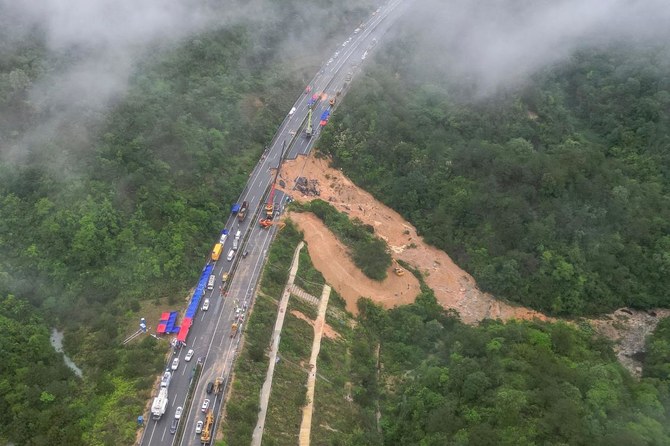
- Reacting swiftly, Wang, a former soldier, positioned his truck to block the highway, effectively stopping dozens of vehicles from advancing into danger
- His wife got out of the truck to alert other drivers about the situation
BEIJING: A Chinese truck driver was praised in local media Saturday for parking his vehicle across a highway and preventing more cars from tumbling down a slope after a section of the road in the country’s mountainous south collapsed and killed at least 48 people.
Wang Xiangnan was driving Wednesday along the highway in Guangdong province, a vital economic hub in southern China. At around 2 a.m., Wang saw several vehicles moving in the opposite direction of the four-lane highway and a fellow driver soon informed him about the collapse, local media reported.
Reacting swiftly, Wang, a former soldier, positioned his truck to block the highway, effectively stopping dozens of vehicles from advancing into danger, Jiupai News quoted Wang as saying. Meanwhile, his wife got out of the truck to alert other drivers about the situation, it said.
“I didn’t think too much. I just wanted to stop the vehicles,” Wang told the Chinese news outlet.
Wang’s courageous actions not only garnered praise from Chinese social media users but also recognition from the China Worker Development Foundation.
The foundation announced Friday that in partnership with a car company it had awarded Wang 10,000 yuan ($1,414). A charity project linked to tech giant Alibaba Group Holding also gave an equal amount to Wang, newspaper Dahe Daily reported. Wang told the newspaper he would donate the money to the families of the collapse victims.
Local media also reported that another man had knelt down to prevent cars from proceeding on the highway.
The accident came after a month of heavy rains in Guangdong. Some of the 23 vehicles that plunged into the deep ravine burst in flames, sending up thick clouds of smoke.
About 30 people were hospitalized. On Saturday, one was discharged from the hospital, state broadcaster CCTV reported. The others were improving, but one remains in serious condition.
On Saturday, the Meizhou city government in Guangdong said in a statement that authorities would conduct citywide checks on expressways, railways and roads in mountainous areas. A team led by the provincial governor is investigating the cause of the collapse, Southcn.com reported.
The Chinese government had sent a vice premier to oversee recovery efforts and urged better safety measures following calls by President Xi Jinping and the Communist Party’s No. 2 official, Premier Li Qiang, to swiftly handle the tragedy.
The dispatch of Zhang Guoqing, who is also a member of one of the ruling Communist Party’s leading bodies, illustrates the concern over a possible public backlash over the disaster, the latest in a series of deadly infrastructure failures.
Russia says it shot down four US-made long range missiles over Crimea

- The ATACMS missiles, with a range up to 300km were used for the first time in the early hours of April 17
MOSCOW: The Russian defense ministry said on Saturday its air defense forces shot down four US-produced long-range missiles over the Crimea peninsular, weapons known as Army Tactical Missile Systems (ATACMS) that Washington has shipped to Ukraine in recent weeks.
The ministry said later that Russian aircraft and air defense systems had downed a total of 15 ATACMS in the past week.
On Tuesday, Russian officials said Ukraine had attacked Crimea with ATACMS in an attempt to pierce Russian air defenses of the annexed peninsula but that six had been shot down.
A US official said in Washington last month that the United States secretly shipped long-range missiles to Ukraine in recent weeks.
The ATACMS missiles, with a range up to 300km were used for the first time in the early hours of April 17, launched against a Russian airfield in Crimea that was about 165 km (103 miles) from the Ukrainian front lines, the official said.
The Pentagon initially opposed the long-range missile deployment, concerned that taking the missiles from the American stockpile would hurt US military readiness.
There were also concerns that Ukraine would use them to attack targets deep inside Russia, a step which could lead to an escalation of the war toward a direct confrontation between Russia and the United States.
Separately on Saturday, the Russian defense ministry said that in the last week its forces had destroyed a military train carrying equipment and arms produced in the West and supplied to Ukraine by NATO.
The scale of the damage, exact date and location were not disclosed.
Reuters is not immediately able to corroborate battlefield accounts from either side.
On Thursday, British Foreign Secretary David Cameron promised 3 billion pounds ($3.7 billion) of annual military aid for Ukraine for “as long as it takes,” adding that London had no objection to its weapons being used inside Russia, drawing a strong rebuke from Moscow.



